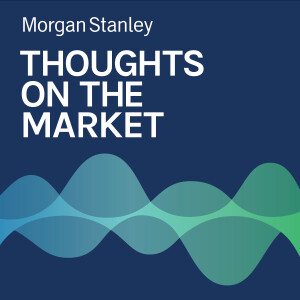
Mike Wilson: Are Stocks Beginning to Question Economic Resiliency?
 2023-09-05
2023-09-05
While valuations may be on the rise, fears around the resiliency of the economy could return and leave unguarded investors on uneven footing.
----- Transcript -----
Welcome to Thoughts on the Market. I'm Mike Wilson, Chief investment Officer and Chief U.S. Equity Strategist for Morgan Stanley. Along with my colleagues bringing you a variety of perspectives, I'll be talking about the latest trends in the financial marketplace. It's Tuesday, September 5th at 10 a.m. in New York. So let's get after it.
In a world of price momentum, opinions about the fundamentals are often driven by the direction of price. Some of this is due to the view that markets are all knowing and often the best leading indicator for the fundamentals. After all, stocks are discounting machines and tell us what's likely to happen in the future rather than what is happening today. The old adage "buy the rumor and sell the news", is another way to think about this relationship. Using this philosophy, the move higher in stocks this year has provided the confidence for many to turn fundamentally bullish from what was an overly bearish consensus backdrop in the first quarter. The entire move in the major U.S. equity averages this year has been the result of higher valuations. However, with forward price earnings multiples reaching 20 times on the S&P 500 last month, not only are stocks anticipating higher earnings and growth, but they now require it. The other reason price momentum works has little to do with the fundamental outlook. Instead, price momentum often leads investors to chase or sell that momentum. It's human nature to want to go with the trend both up and down.
Most were too negative on the economy at the beginning of the year, including us. The failure of a few large regional banks and negative price reaction in the stock market reinforced that view. However, when the recession didn't arrive, there was a fundamental reason to reverse that view. The price action in April and May supported that pivot, further feeding the bullish narrative. However, the move in price was very narrow, led by just a handful of Mega-cap growth stocks. In June, breadth improved, dragging investor confidence toward the optimistic fundamental outcome. But since then, breath has rolled over again and remains weak. We recommend maintaining a late cycle mindset, which means a barbell of growth stocks and defensive, not cyclicals or smaller stocks.
Going into the second quarter earnings season we suggested it would be a "sell the news event", mainly because stocks had rallied in the mid-July, which was a change from the past several quarters where stocks trended weaker into results. Now that earnings season is over, we know that the price reaction post reporting was some of the weakest we've witnessed in the past decade. We think stocks may be starting to question the sustainability of the economic resiliency we experienced in the first half of the year. Defensives and growth stocks have done better than cyclicals. As an aside, the earnings results have not kept pace with the economy this year outside of a few areas which have been driven mostly by cost cutting rather than top line growth which furthers the idea we are still late cycle, not early or mid.
This past week, equity prices have rebounded sharply, led once again by growth stocks. With softer economic data weighing on Treasury yields, stock market participants seem willing to bid valuations back up on the view the late cycle environment is being extended once again. With inadequate evidence to affirm or contradict that view, price continues to be the governing factor for many investors' conclusions about where we are in the cycle. Bottom line price momentum is a key driver of sentiment, especially in a late cycle environment when uncertainty about the outcome is high. We continue to recommend a more defensive growth posture in one's portfolio given that the fears of recession or financial distress could return at any moment in the late cycle environment in which we find ourselves, particularly as we enter September.
Thanks for listening. If you enjoy Thoughts on the Market, please take a moment to rate and review us on the Apple Podcast app. It help's more people to find the show.
More Episodes
 2024-09-13
2024-09-13
 2024-09-12
2024-09-12
 2024-09-11
2024-09-11
 2024-09-10
2024-09-10
 2024-09-09
2024-09-09
 2024-09-05
2024-09-05
 2024-09-04
2024-09-04
 2024-09-03
2024-09-03
 2024-08-29
2024-08-29
 2024-08-28
2024-08-28
 2024-08-27
2024-08-27
 2024-08-26
2024-08-26
 2024-08-23
2024-08-23
 2024-08-22
2024-08-22
 2024-08-19
2024-08-19
 2024-08-16
2024-08-16
Create your
podcast in
minutes
- Full-featured podcast site
- Unlimited storage and bandwidth
- Comprehensive podcast stats
- Distribute to Apple Podcasts, Spotify, and more
- Make money with your podcast
It is Free
- Privacy Policy
- Cookie Policy
- Terms of Use
- Consent Preferences
- Copyright © 2015-2024 Podbean.com




